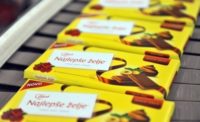
By Bernard Pacyniak





Pionir d.o.o.
Headquarters: Belgrade, Serbia
Plants: Subotica (candies, chocolates, desserts, biscuits); Zemun (extruded, coated snacks); Paracin (wafers, cookies, crackers); and Hissar (Chocoaltes, praline, desserts, jams and marmalades)
Employees: 1,200
Sales: €80 million ($133 million)
Output: 32,000 tons
Products: Hard candies, fruit-filled candies, toffees, gummies, chocolate bar, pralines, snack and energy bars, biscuits, wafers, cookies, Swiss roll cakes, specialty dessert products, snack crackers, jams and marmalades.
Product Mix: Candies – 37%; chocolates – 23%; biscuits – 21% and desserts – 19%.
Brands: Pionir, Look, Menthol, Karamela Lesnik, Diamond, Galeb, Kidy, Mony, Lesnik, Choco O’clock, Vitanova, Lovely, Medeno Srce (Honey Cake), Rola la!, Choco Ola la!, Negro, Minjon, Picanto, Mania, Sun Mill, and Napolitanka.
Management team: Miroljub Aleksic, president, Zoran Denic, sales manager; Branimir Kopilovic, investments manager; Radisa Nikolic, director; Slavica Jovanovic Kunji, marketing manager; Ildiko Kovac, export manager; Ljiljana Lalic, R&D manager; Zoran Bogdanovic, production manager - Subotica





